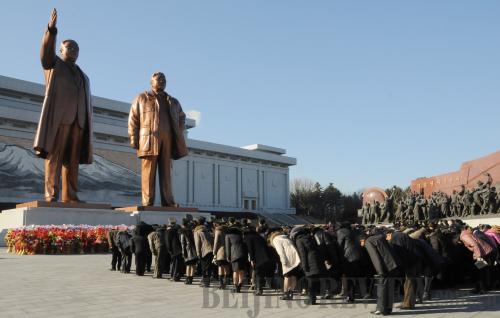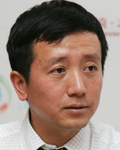|
 |
|
PAYING RESPECTS: Citizens of the DPRK bow in front of bronze statues of the late North Korean leader Kim Jong Il and his father Kim Il Sung in Pyongyang on February 15, a day before Kim Jong Il's birthday (DU BAIYU) |

The Democratic People's Republic of Korea (DPRK) on February 12 carried out its third nuclear test—the first since Kim Jong Un came into power. The test triggered a storm of reaction from the international community, including worries about a possible leak of nuclear materials among neighboring countries.
Analysis of the greater context shows that the primary purpose of possessing nuclear capability is not to wield nuclear power, nor to conquer the world, but to ensure a necessary external security environment to develop its economy.
Safety and economy
According to socialist political economic principles, a socialist economy must satisfy people's material and cultural needs depending on a highly developed technological basis. However, a socialist country like the DPRK cannot concentrate fully on its own economic development strategy because of the tough external environment of Western economic blockades, or even the threat of military intervention.
In a legal sense, the Korean Peninsula has never ended its state of war since the truce with the United States and the Republic of Korea (ROK) in 1953. The DPRK felt great pressure from the West and the ROK after the dissolution of the Soviet Union, which was the reason it implemented the Seogun (military-first) policy. Moammar Gadhafi of Libya abandoned his nuclear development plan as the West required, and he ended up dead after losing his bearings against the West's wanton bombing in Libya's civil war. Gadhafi's death further cemented the DPRK leadership's determination to develop its nuclear capability. Although the process may be bumpy, the DPRK leaders and government will switch focus to economic construction and livelihood after the DPRK realizes its primary purpose.
The DPRK has shown some changes on domestic policy, institute setting, and construction plans since Kim came into power. These changes have attracted wide concerns, especially from Northeast Asian countries.
Kim iterated many times after assuming office that the country's priority will be developing the economy. In June 2012, Kim declared establishing a new DPRK-style economic management system. In his New Year speech of 2013, Kim described the year ahead with words like "innovation" and "big turnaround," stressing that the top task of the DPRK is economic construction. High-ranking officials like Vice Foreign Minister Pak Gil Yon laid stress on developing the economy at the UN assembly. Moreover, it was rumored that there could be a reform of the DPRK's agricultural management system in the works. And DPRK high-ranking officials are attempting to concentrate economic management power in the cabinet.
| 